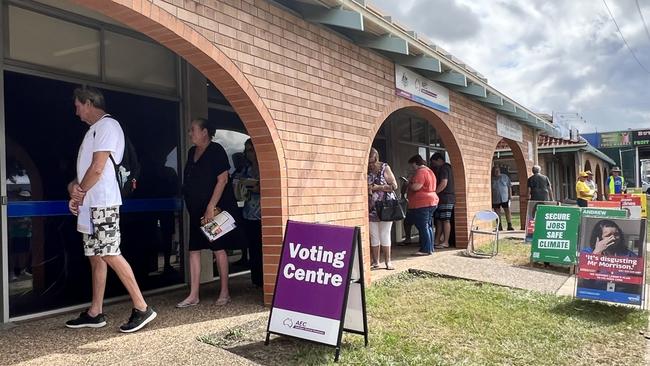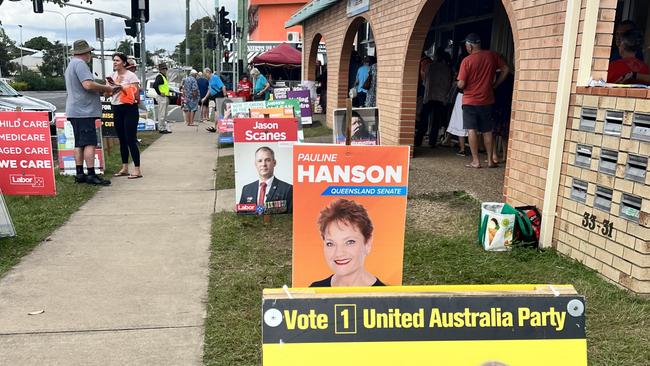Bundaberg, Hervey Bay voters one of the worst for informal votes
Voters in Bundaberg and Hervey Bay are some of the worst in the nation when it comes to rude drawings or profanities on ballot papers, but they are also the voters with the biggest pre election turnout in Australia.
Bundaberg
Don't miss out on the headlines from Bundaberg. Followed categories will be added to My News.
Bundaberg and Hervey Bay voters are among the most likely to give democracy a big fat middle finger, using their ballot to draw rude pictures or write profanities rather than numbering candidates, new data has shown.
These ballots, along with ballots unintentionally filled out incorrectly, are classed as “informal” by the Australian Electoral Commission -- and voters in the electorate of Hinkler are among Australia’s worst offenders.
Inversely - or perhaps not - by the close of the pre-poll booths on Tuesday, almost a third of Hinkler voters had already cast their vote, making it the electorate with the highest pre-poll turnout in Australia in the 2022 federal election.
In Hinkler, about one in 13 ballots at the 2019 federal election (7.8 per cent) were deliberately or inadvertently thrown away, compared to about one in 20 ballots for the nation broadly.

A Bundaberg scrutineer said he doesn’t mind what people want to draw or write on ballot papers.
He said while he’s seen ‘horrendous’ words and images on ballots, it’s all about the numbers.
“People can write and draw whatever they like on ballot papers as long as they’re numbered,” he said.
“It’s the numbers that count.
“They need to be numbered one through to six, that’s what we look at.”
Local resident Allan Hosking said he couldn’t imagine why anyone would want to throw away their right to vote.
“It’s ridiculous,” he said.
“Make your vote count.”
Hinkler resident resident, Kaylene Dwyer had a similar view.
“People have a democratic right to vote, they’re on the electoral system so it’s such a key opportunity for them to say who they want to see elected,” she said.
“It’s the scrutineers who have to see all that, and it’s really disappointing that people come to make the time to vote to basically waste their vote by writing profanities and deliberately doing an informal vote and turning up with that intention.”
A lack of interest among Hinkler voters may also stem from the fact it is a safe LNP seat.

Political commentator and Griffith University associate professor Paul Williams said people were more likely to throw away their vote if they believed it would not make a difference anyway.
“(Most) informal ballots are unintentional – people who do not understand how to fill out a ballot for the House of Representatives,” he said.
“(The rest) are deliberate spoilers of ballots.
“They feel there is no choice in Australia, that one vote can’t change anything, and they are just going through the motions so they don’t get a fine.”
An AEC analysis of almost half a million informal votes in the 2013 federal election revealed as many as two in five informal ballots were intentionally sabotaged.
This included about 21 per cent that were left completely blank and 15 per cent with “scribbles, slogans and other protest vote marks”.
However, the most common reason for a ballot to be deemed ineligible was because the voter put a 1 against their favourite candidate but did not number the rest of the boxes (29.5 per cent of all informal votes).
About 11 per cent used ticks and crosses rather than numbers, 14 per cent used non-sequential numbering, and 1 per cent featured handwriting so messy the numbers could not be discerned.
Other Victorian divisions with high rates of informal voting include Calwell, in Melbourne’s outer north-west fringe (9.2 per cent) and Nicholls in northern Victoria (7.5 per cent).
So, why does it matter? Isn't drawing dicks and middle fingers on a ballot paper all just a bit of fun? Don’t the vote-counters have a giggle when they see I wrote “Myself” and drew a box and ticked that instead?
In 2019, there were 22 electorates where the number of informal votes was higher than the margin between the two most popular parties, meaning if all of those ballots had been correctly cast and for the runner up, there would have been a different result.
Even if only the intentional protest ballots were redirected to the runner up (assuming a third of informal votes fit this category), there are still six electorates that would have had a different result -- Eden-Monaro (NSW), Blair (QLD), Macquarie (NSW), Cowan (WA), Chisholm (VIC) and Bass (TAS).
Ladbrokes currently has Labor at shorter odds to win the federal election.
Labor pays $1.37 and the Coalition pays $3.20.




